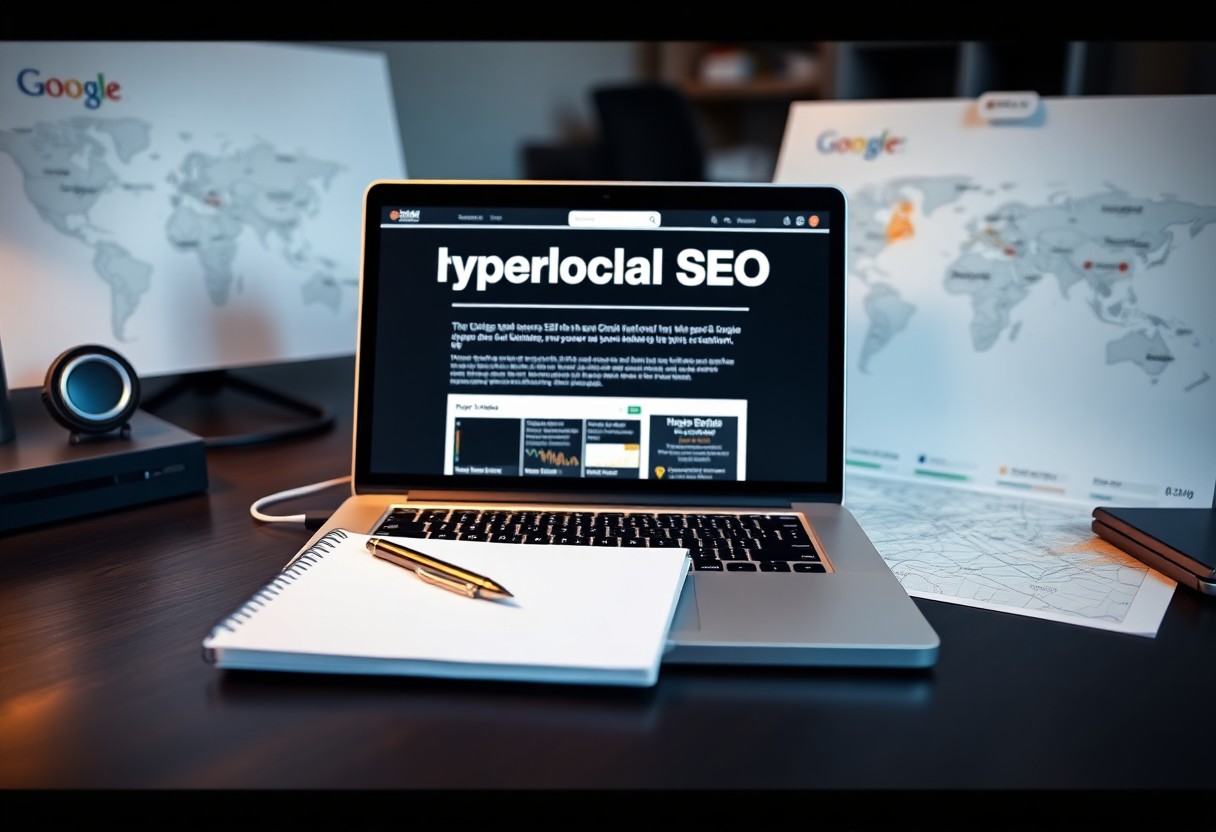As you explore the world of local SEO, you're probably wondering what sets apart top-ranking hyperlocal content from the rest. The answer lies in crafting titles that resonate with your target audience and search engines alike. You see, a well-crafted hyperlocal SEO title can make all the difference in driving organic traffic to your website. In this post, we'll walk you through the secrets of writing attention-grabbing, rank-worthy titles that will get your local business noticed online. Buckle up, and let's get started!
The Importance of Hyperlocal SEO Titles
A well-crafted hyperlocal SEO title can make all the difference in your local search engine rankings. It's the first thing users see when searching for local businesses, and it plays a significant role in determining whether they'll click on your website or not. In fact, a study found that 60% of users click on the first three search results, making it vital to optimize your title for maximum visibility.
Why Location-Based Keywords Matter
At the heart of every successful hyperlocal SEO strategy lies location-based keywords. These keywords help search engines understand your business's geographic relevance, increasing the likelihood of appearing in local search results. By incorporating location-based keywords into your title, you're signaling to search engines that your business is relevant to users in a specific area.
The Role of Titles in Local Search Rankings
Above all, your title serves as a direct call-to-action, enticing users to click on your website. It's also a key ranking factor, as search engines use title tags to understand the content of your page.
Consequently, a well-optimized title can significantly improve your local search rankings. When you include relevant location-based keywords in your title, you're increasing the chances of ranking higher in search engine results pages (SERPs). This, in turn, drives more traffic to your website, ultimately leading to more conversions and sales for your business. By optimizing your title, you're taking the first step towards dominating local search rankings and growing your business.
Crafting the Perfect Hyperlocal SEO Title
The key to crafting a hyperlocal SEO title that ranks is to strike a balance between relevance, readability, and optimization. You want to create a title that accurately reflects the content of your page, resonates with your target audience, and incorporates the right keywords to attract search engines.
Identifying Your Target Location
Locating your target audience is the first step in crafting a hyperlocal SEO title. You need to pinpoint the specific geographic area you're targeting, whether it's a city, state, or zip code. This will help you tailor your title to speak directly to that audience and increase your chances of ranking locally.
Incorporating Local Keywords Naturally
For maximum impact, you need to incorporate local keywords naturally into your title. This means using phrases that include your target location, such as "New York City plumbers" or "Los Angeles dentist."
Further, it's important to use these keywords in a way that feels organic and authentic. Avoid stuffing your title with keywords or using awkward phrasing that disrupts the flow of the sentence. Instead, focus on creating a title that reads naturally and provides value to your target audience. By doing so, you'll increase your chances of ranking higher in local search results and attracting more relevant traffic to your site.
Title Structure and Format
While crafting a hyperlocal SEO title, it's necessary to follow a structured format that appeals to both search engines and users. A well-structured title should clearly convey the topic, location, and relevance of your content. This format will help you create a title that resonates with your target audience and improves your search engine rankings.
The Ideal Length and Character Count
One of the most critical aspects of a hyperlocal SEO title is its length. You should aim for a title that is descriptive yet concise, ideally between 55-60 characters. This length allows you to provide enough information without getting truncated in search engine results pages (SERPs).
Using Punctuation and Symbols Effectively
An effective use of punctuation and symbols can make your title more attention-grabbing and informative. You can use pipes (|), dashes (-), or commas (,) to separate keywords and phrases, making your title more readable and scannable.
Character limits can be restrictive, but using punctuation and symbols strategically can help you convey more information within those limits. For instance, you can use parentheses to add additional context or provide a specific location. By using these elements wisely, you can create a more informative and compelling title that drives clicks and conversions.
Writing for User Intent and Search Queries
All successful hyperlocal SEO titles start with understanding the user's search intent. You need to put yourself in your target audience's shoes and think about what they're searching for. What are their pain points, and how can you provide a solution? By doing so, you'll be able to craft titles that resonate with your audience and increase your chances of ranking higher in search engine results pages (SERPs).
Anticipating What Users Are Searching For
Before you start writing your title, take some time to brainstorm keywords and phrases that your target audience might be using. Think about the specific location, industry, and services you're targeting. What are the common search queries related to your business? By anticipating what users are searching for, you'll be able to create titles that match their search intent.
Creating Titles That Answer Questions
User-centric titles are all about providing a solution to a problem or answering a question. You want to create titles that directly address the user's search query, making it clear that your content provides the answer they're looking for.
At this stage, it's necessary to focus on the benefits of your content rather than just listing features. For example, instead of using a title like "Best Italian Restaurants in New York City," you could use "Where to Find the Tastiest Italian Food in NYC?" This approach not only answers the user's question but also piques their curiosity, encouraging them to click on your article.
Common Mistakes to Avoid in Hyperlocal SEO Titles
Now that you know the importance of crafting a perfect hyperlocal SEO title, it's equally important to avoid common mistakes that can hinder your title's performance. A well-crafted title can make all the difference in driving traffic and boosting conversions, but a poorly crafted one can lead to dismal results.
Over-Optimization and Keyword Stuffing
For instance, using the same keyword repeatedly in your title may seem like a good idea, but it can actually lead to penalties from search engines. Your title should be descriptive, attention-grabbing, and optimized for search engines, but it should also read naturally and provide value to your audience.
Lack of Relevance and Misleading Titles
At the same time, you need to ensure that your title accurately reflects the content of your page. Misleading titles can lead to high bounce rates and a loss of trust with your audience.
In fact, when you create a title that doesn't match the content of your page, you're not only disappointing your audience, but you're also wasting their time. This can lead to a negative user experience, which can ultimately harm your website's credibility and rankings. You need to strike a balance between creating a compelling title and accurately representing the content of your page.
Examples of Effective Hyperlocal SEO Titles
To help you better understand how to craft hyperlocal SEO titles that rank, let's examine some examples across different business types. These titles incorporate location-based keywords, target specific search queries, and are optimized for search engines.
Service-Based Businesses (e.g., Plumbers, Lawyers)
On the service-based front, effective hyperlocal SEO titles focus on the specific service offered and the location it's provided in. For instance, "Emergency Plumber Services in Downtown LA" or "Top-Rated Divorce Lawyers in Chicago's North Side". These titles cater to users searching for specific services in specific areas.
Product-Based Businesses (e.g., Restaurants, Retail Stores)
By highlighting the unique aspects of your product offerings and associating them with a specific location, you can create compelling hyperlocal SEO titles. For example, "Best Italian Restaurants in Brooklyn's Williamsburg" or "Discount Furniture Stores in Houston's Energy Corridor".
Restaurants, in particular, can benefit from incorporating location-based keywords that appeal to foodies and locals alike. Consider titles like "Top-Rated Sushi Spots in San Francisco's Japantown" or "Best Brunch Cafes in Austin's South Congress". By doing so, you'll increase your chances of ranking for hyperlocal search queries and attracting more customers to your establishment.
Summing up
With this in mind, you now have the tools to craft a hyperlocal SEO title that drives traffic and boosts your online visibility. By incorporating location-based keywords, highlighting your unique selling proposition, and keeping it concise, you'll be well on your way to outranking your competitors. Use the 20 samples provided as inspiration to optimize your title tags and watch your website climb the search engine rankings. By following these tips, you'll be able to attract more local customers and grow your business.


